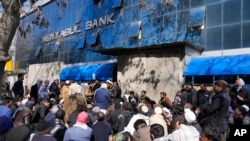Russia hosted a multilateral meeting Wednesday where participants renewed a call for the United States to unblock Afghanistan’s central bank assets and urged the Taliban rulers to ensure women access to public life and education in Afghanistan.
China, Pakistan, Kazakhstan, Kyrgyzstan, Iran, India, Tajikistan, Turkmenistan, Uzbekistan, Saudi Arabia and Turkey attended what is known as the Moscow format of consultations on Afghanistan.
Zamir Kabulov, the Russian special presidential envoy, said in his inaugural speech the meeting was being held for the first time without the participation of Afghan representatives.
"We resolutely demand that the U.S. and its allies unconditionally unblock Afghanistan’s national financial assets in order to provide the (Taliban) authorities with the opportunity to exercise their legal right to pursue an independent financial and economic policy,” said Kabulov.
He expressed concern over the Taliban’s not forming what he called an ethno-political inclusive government to run the country, referring to marginalized Afghan minority groups in the country. Kabulov said such a system of governance would promote “a true national reconciliation in Afghanistan.”
Russian authorities continue to treat the Taliban as a terrorist group and outlaw it on their territory. Moscow has allowed the Taliban to operate the Afghan diplomatic mission in Russia.
The Taliban seized power in August 2021 when the internationally-supported Kabul government collapsed and all U.S.-led foreign troops withdrew from Afghanistan.
Speakers at Wednesday’s event in the Russian capital noted that Taliban delegates were invited to last year’s Moscow format consultations, where participating countries had “laid down principles to govern practical engagement” with the new Afghan rulers.
Pakistan’s special envoy, Mohammad Sadiq, said promoting political inclusivity, countering terrorism and respecting rights of Afghans, including women were among the principles outlined in the engagement. But the Taliban did not show progress on those counts, he said.
“Nowhere this is more apparent than on the question of ‘inclusiveness.’ Unfortunately, there is little to show on this count,” Sadiq said. "Despite assurances by the interim Afghan government, the rights of women and girls also appear to have regressed, not progressed. The footprint of terrorist organizations in Afghanistan has yet to be fully eradicated, the Pakistani envoy said.
Delegates at the Moscow event largely stressed the need for the global community’s sustained engagement and cooperation with the country to help Afghans secure a durable peace after four decades of war and bloodshed.
The United States and other Western partners suspended financial assistance to Kabul after the Taliban seized power. The Biden administration subsequently imposed banking sector sanctions and froze $7 billion in Afghan central bank foreign reserves to prevent them from falling into the hands of the Islamist group. More than $2 billion is also held in Europe.
The Taliban have increasingly excluded women from public life since returning to power 15 months ago, despite promising a moderate version of the harsh governance that characterized their first government from 1996 to 2001. The policies have deterred foreign governments from formally recognizing the new Afghan leadership.
Most female public sector employees in Afghanistan have been ordered to stay at home, women are barred from long road travel without a male guardian and they must cover their faces in public.
Teenage girls have also been barred from resuming secondary-school education beyond grade six. Last week, the radical group banned women from visiting amusement parks and using public baths as well as gyms across Afghanistan.
The Taliban defend their male-only government, saying it represents all Afghan groups. They reject criticism of their governance, maintaining it is in line with Afghan culture and Islamic law.
On Tuesday, the United Nations Assistance Mission in Afghanistan or UNAMA renewed its call for the Taliban to reverse their latest restrictions on women’s rights.
“UNAMA is deeply concerned by recent Taliban officials' statements & mounting on-the-ground reports of women being prevented from using parks, gyms and baths. All Afghans' rights should be upheld, particularly women’s access to all forms of public life and girls right to education,” the mission said on Twitter.




